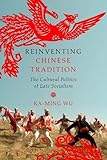Reinventing Chinese tradition : the cultural politics of late socialism / Ka-ming Wu.
Material type: TextSeries: Interpretations of culture in the new millenniumPublisher: Urbana : University of Illinois Press, [2015]Description: 1 online resourceContent type:
TextSeries: Interpretations of culture in the new millenniumPublisher: Urbana : University of Illinois Press, [2015]Description: 1 online resourceContent type: - text
- computer
- online resource
- 9780252097997
- 0252097998
- Yan'an Shi (China) -- Politics and government
- Yan'an Shi (China) -- Rural conditions
- Yan'an Shi (China) -- Social life and customs
- Communism -- Social aspects -- China -- Yan'an Shi
- Post-communism -- Social aspects -- China -- Yan'an Shi
- Politics and culture -- China -- Yan'an Shi
- Social change -- China -- Yan'an Shi
- Ethnology -- China -- Yan'an Shi
- SOCIAL SCIENCE / Anthropology / Cultural
- HISTORY / Asia / China
- POLITICAL SCIENCE / Political Ideologies / Communism & Socialism
- Communism -- Social aspects
- Ethnology
- Manners and customs
- Politics and culture
- Politics and government
- Post-communism -- Social aspects
- Rural conditions
- Social change
- China -- Yan'an Shi
- 951/.43 23
- DS796.Y4
- SOC002010 | HIS008000 | POL005000
- POL005000.
"Yan-an, China was the main organizing site of Chinese communism from 1935 to 1949. As the final destination of the Long March and center of the 'red bases,' it acquired mythical status during the Maoist period as the symbol and epitome of the Communist Party's triumph. Yet in the post-Mao period, Yan-an's significance diminished, along with its role as an emblem of revolutionary heroism. In this study, Ka-ming Wu presents an ethnographic account of contemporary Yan-an. She looks at Yan-an today to see what happened to that society and culture in the post-socialism era. Wu examines new dynamics between state and society in light of how rural residents in northwest China make sense of rapid social changes. Under Mao, Yan'an's rural culture was stripped of its spiritual contents and reorganized around socialist, anti-imperial rhetoric to glorify communists' socioeconomic reforms. Since the 1980s, rural Ya'an has been reimagined as a hinterland of ancient cultural traditions. Wu documents how revivals of rural practices are reworked within the socialist legacy, including folk paper-cutting, a local form of musical storytelling, and spiritual cults of local deities. Even though Mao had repressed these practices, surprisingly their current revival has brought out the sacredness or urgency of the revolution's legacy. Instead of assuming that ascendent market forces have replaced state socialism, the dominant line about post-Mao China today, Wu probes the various cultural practices in contemporary Yan'an that evade total commercialization. She contends that this public realm contains powerful religious and ritual practices that produce new forms of meaning out of turbulent rural conditions and new dynamics of state-society relations in the post-socialist era"-- Provided by publisher.
Includes bibliographical references and index.
Description based on print version record.
Paper-Cuts in Modern China : The Search for Modernity, Cultural Tradition, and Women's Liberation -- Narrative Battle : Fabricating Folk Paper-Cutting as an Intangible Heritage -- Traditional Revival with Socialist Characteristics : Propaganda Storytelling Turned into Spiritual Service -- Folk Cultural Production with Danwei Characteristics : Folk Storytelling and Public Relations Activities -- Spirit Cults in Yan'an : Surrogate Rural Subjectivity in the Urbanizing Rural -- Glossary.
eBooks on EBSCOhost EBSCO eBook Subscription Academic Collection - Worldwide

